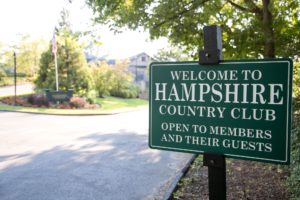Judge orders village to reveal more in Mamaroneck country club case
The Village of Mamaroneck has been ordered to produce documents and witnesses in a developer’s lawsuit that claims that the government in effect took its property by denying residential development at Hampshire Country Club.
Westchester Supreme Court Justice William J. Giacomo ordered Mamaroneck to turn over documents and reply to Hampshire Recreation LLC’s questions by Dec. 22, and to produce mayor Thomas Murphy and one member of the planning board for depositions within 45 days.

Giacomo issued the orders on Nov. 15 and the village appealed his decision the following day. The village argues that the judge erred because the developer was seeking irrelevant material, the demands for information are overbroad and unduly burdensome, and the village’s records and officials are protected from disclosure.
In 2010, Hampshire Recreation bought the 106-acre country club for $12 million. In 2015 it submitted plans for building 105 homes, including single family houses and townhouses on 65 acres; setting aside 31 acres of open space; preserving existing wetlands; and downsizing the golf course to nine holes.
After nearly five years of hearings and deliberations, the planning board rejected the plans, finding, in part, that the development would create significant environmental impacts.
In 2021, Hampshire sued the village for $58.1 million, claiming that officials had in effect rezoned the property to disallow residences, and had never intended to provide a fair and good faith opportunity to develop the site.
The village’s actions destroyed the value of the property, the developer claimed, and amounted to a regulatory taking of property.
Hampshire claimed that the village was withholding necessary information during the pre-trial discovery process. For instance, in response to a request for a consultant’s report of possible residential uses, when Mamaroneck considered buying the property in 2010, the village provided a redacted version.
The developer also sought communications between government officials and testimony by four planning board members and Mayor Murphy who, Hampshire alleges, has been outspoken about the village’s desire not to have any residential development at the country club.
Liberal discovery “encourages fair and effective resolution of disputes on the merits,” Giacomo noted, in citing a court precedent, “minimizing the possibility for ambush and unfair surprise.”
The governmental deliberative process, he said, is meant to ensure that agency decision makers express their opinions freely. But the Court of Appeals has never recognized a generalized deliberative process privilege, he said, and even if there was such a privilege the court would still have to consider the litigant’s need for access to information.
The village argued that the request for documents was overbroad and unduly burdensome because it has millions of emails and documents.
The issue, Giacomo stated, is relevancy not quantity. He found that some of the requests were overbroad, for instance, because the time frame was too long. But he ruled that the village had to produce many records that are relevant to Hampshire’s allegations.
Hampshire was represented by White Plains attorneys David J. Cooper and Jody T. Cross. The village was represented by White Plains attorneys Robert Spolzino and David Imamura.